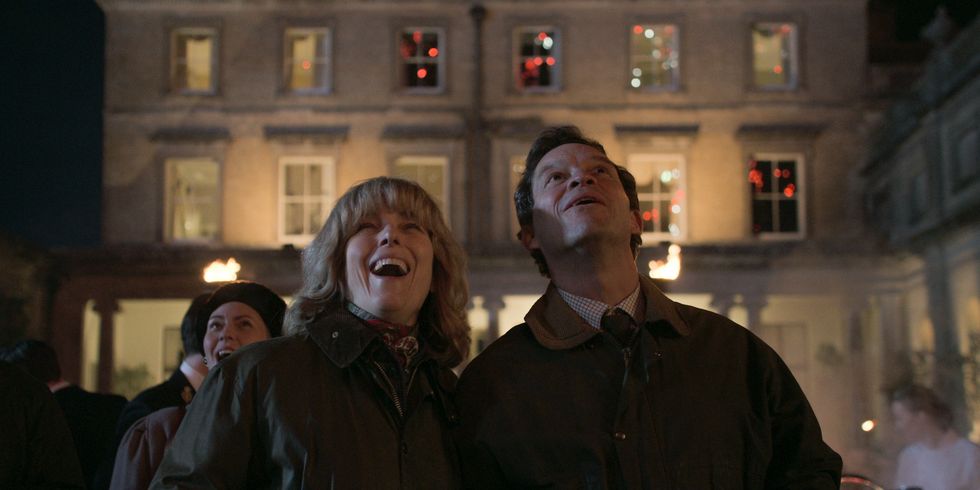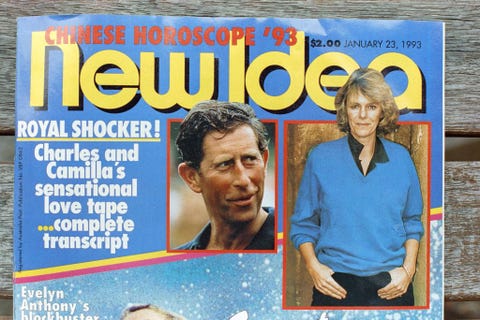Why Did The Crown Make Tampongate So…Sweet?
In the year 1989, Prince Charles nearly threatened his claim to the throne with the mere mention of a menstrual product. Three decades later, The Crown transformed his horror into a touching romantic interlude.
That an event known as “Tampongate”—or “Camillagate,” depending on your sourcing—would become a pivotal moment in a Netflix series speaks to the monarchy’s bizarre intrigue. In the new season of Peter Morgan’s drama The Crown, Dominic West and Olivia Williams portray Charles and his mistress, Camilla Parker-Bowles, as the latter lounges in bed: She’s interrupted her family’s Christmas celebrations to field a call from the prince, languishing in his longing for her. After HRH dictates a draft of his latest speech, Camilla injects a bit of innuendo, which Charles initially chides before hopping into the ring. (This is when the Tampax in question makes its long-anticipated appearance.) As depicted between West and Williams, the Tampax joke is the kind of affectionate joshing an outsider to a relationship might struggle to comprehend; to those within it, it’d seem as natural as breathing. And so the feeling an audience is left with is not, in fact, disgust, but something like empathy. Even endearment.
The scene contributes to a narrative within The Crown’s fifth chapter that’s equal parts comforting and confounding. Contrary to what many royalists believed would be the case, Morgan’s latest season takes real pains to humanize the now-King Charles. His affair with Camilla—while certainly a scandal, and a cruel, unjust treatment of the Princess of Wales—is framed as a preventable tragedy between star-crossed lovers, rather than a scurrilous act of high-society selfishness. West’s Charles exits the finale with the pallor of a romantic hero, even if a chastened one. And Tampongate itself is washed of its horror. Instead, the ensuing public fallout is used as an opportunity to highlight Charles and Camilla’s romantic resilience.
Comparing this depiction with real-life events, then, may complicate the audience’s feelings even more. It’s difficult to understate just how appalling the tape seemed when printed (and played) for millions of Britons to digest in the late 1980s and early ’90s, prompting a malaise that lasted well into the 21st century.
“Even after many airings, you feel uncomfortable listening in,” journalist Tina Brown writes in her 2007 book The Diana Chronicles. “The banal and grubby little vulnerabilities they reveal define what Hillary Clinton once hopefully called the Zone of Privacy.”
The actual call did take place on a night around Christmas: Dec. 17, 1989, when the prince was staying at Eaton Lodge and Mrs. Parker-Bowles at her home, Middlewick House. Over the course of the recording, both the prince and his mistress admitted several startling things—not the least of which was Charles informing Camilla, “Your greatest achievement is to love me”—but the Tampax is what, of course, most remember best. A brief transcript is as follows:
CHARLES: What about me? The trouble is I need you several times a week.
CAMILLA: Mmm, so do I. I need you all the week. All the time.
CHARLES: Oh, God. I’ll just live inside your trousers or something. It would be much easier!
CAMILLA: [Laughs]: What are you going to turn into, a pair of knickers? [Both laugh.] Oh, you’re going to come back as a pair of knickers.
CHARLES: Or, God forbid, a Tampax. Just my luck. [Laughs]
CAMILLA: You are a complete idiot! [Laughs.] Oh, what a wonderful idea.
CHARLES: My luck to be chucked down a lavatory and go on and on forever swirling round on the top, never going down.
CAMILLA: [Laughs.] Oh, darling!
CHARLES: Until the next one comes through.
CAMILLA: Oh, perhaps you could just come back as a box.
CHARLES: What sort of box?
CAMILLA: A box of Tampax, so you could just keep going.
CHARLES: That’s true.
CAMILLA: Repeating yourself . . . [Laughs]. Oh, darling, oh, I just want you now.
Their conversation reached the newspapers through a strange twist of fate. A tech enthusiast in Merseyside was fiddling with his electronic homing device when he just so happened to pick up on the conversation between Charles and Camilla. As Brown writes in The Diana Chronicles, “The Prince was very close to a cellular transmitting station just outside the country home in Cheshire where he was staying, and his voice was immediately recognizable.” This stranger clocked the libidinous nature of their chat, but—unlike in The Crown—he kept the tape to himself for two years, until after Diana’s own “Squidgygate” tapes became public, and he realized he could make money off his secret possession. He rushed the Tampongate recording to the Daily Mirror, which paid 30,000 pounds for it. The resulting story ran in two parts, on November 11 and 13, 1992, during the queen’s so-called “annus horribilis” and mere days before the Windsor Castle fire. The headline: “Camilla Confidential.”
The blowback was swift and immediate, the mockery inescapable. Suddenly, there was no denying that the future king was conducting an affair, betraying the beloved Princess Diana. (Even if she, too, had been caught in her own infidelities.) Approval of Charles as heir to the throne plummeted. As Brown writes in her 2022 book The Palace Papers, the Queen’s cousin Princess Alexandra of Kent expressed concerns over whether the monarchy would survive the scandal. So did Charles. Brown writes, “Charles’s stalwart circles of aristocratic friends were recipients of even more tortured late-night calls from him than usual.” Camilla could barely leave her home; if she did, she was harassed and spit on.
With the wisdom of hindsight, The Crown looks back on this moment with a gentler gaze. West himself told Entertainment Weekly that, when he was young and first heard the tape, he considered it “sordid and deeply, deeply embarrassing.” But he added, “Looking back on it, and having to play it, what you’re conscious of is that the blame was not with these two people, two lovers, who were having a private conversation. What’s really [clear now] is how invasive and disgusting was the press’s attention to it, that they printed it out verbatim and you could call a number and listen to the actual tape. I think it made me extremely sympathetic towards the two of them and what they’d gone through.”
In truth, there is some blame to be placed with Charles and Camilla. They were conducting an affair. Charles was cheating his wife and future queen on every possible level, and doing so with little regard for her well-being. The lovers relied on a large cast of friends and confidants to support their relationship and protect its secrecy, a reliance they perhaps took for granted. But West is correct that the Tampongate conversation was a private one, conducted with the trust and openness of that privacy. The media fallout was unrelenting and sadistic.
West is also correct in his implication that Camilla, by any measure, was a more natural match for the prince than his wife. The Crown illustrates this conundrum well: The Tampongate scene plays so sweetly not because Morgan flashed his creative license, but because it was sweet. Charles and Camilla loved each other then. They love each other now. They made a goofy dirty joke. Lovers love goofy dirty jokes.
The Crown’s Tampongate scene needed to be sweet, if it were to accomplish Morgan’s true goal: to humanize those embroiled in its scandal. Whether or not season 5 succeeds as a whole is a larger issue—and a debatable one. But the Tampongate scene works. It had to, if it were illuminate the truth of the Wales’s marriage: No one was winning. Everyone was at fault. The crown does nothing to erase the fallibility of those whose head it adorns.
Lauren Puckett-Pope is an associate editor at ELLE, where she covers film, TV, books and fashion.



